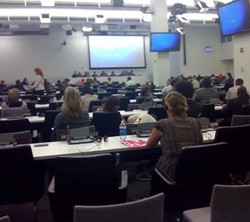A reflection on the Open-ended Working Group on Ageing for the purpose of strengthening the protection of Human Rights of older persons
August 1-4, 2011
Peng Leong
First Chinese Presbyterian Church of New York City
Volunteer Intern, Presbyterian Ministry at the United Nations
 I have been working with older persons for many years in my church as a member of the Board of Community Affairs Corporation running social and educational programs in my own corner of the world—New York’s Lower East Side. Our mission is to provide home care services to older persons so that they can remain in their own homes and live a life of independence and freedom. As a board member I am constantly vigilant against neglect, abuse and violence by caretakers against older persons. Our guidelines and handbooks stress the need for compassionate care. Because of this work, I was glad to attend the meeting of the Open-ended Working group on Ageing.
I have been working with older persons for many years in my church as a member of the Board of Community Affairs Corporation running social and educational programs in my own corner of the world—New York’s Lower East Side. Our mission is to provide home care services to older persons so that they can remain in their own homes and live a life of independence and freedom. As a board member I am constantly vigilant against neglect, abuse and violence by caretakers against older persons. Our guidelines and handbooks stress the need for compassionate care. Because of this work, I was glad to attend the meeting of the Open-ended Working group on Ageing.
At the opening session of the forum, the chair, H. E. Mr. Jorge Arguello (Argentina) invited member delegates to make their statements of current situations of Human Rights of older persons around the world. Japan shared an impressive action plan. The government is involved and has a national as well as international action plan for their ageing population. There are good pension plans and health reforms to take care of the health of all citizens including the elderly.
In Brazil, the government has legislation to protect the rights of older people from discrimination. The National Council and civil bodies provide direct government involvement in the rights of the people to health free medical services and medication, and to social security plans. Other countries with good legislation include the United States, Canada, New Zealand, and Israel. These countries have legislation for the protection and rights of the older people to live lives of freedom and happiness and to enjoy social security and financial security after the age of sixty. The older person also has a choice to continue in the work force without discrimination.
NGOs also had a chance to present reports. Groups included in the NGO Committee on Ageing, International Federation on Ageing, Federal Association of International Civil Servants, American Association of Retired Persons and Global Action on Ageing. There were no Christian groups that spoke. I did notice a book by Susanne S. Paul and James A. Paul, Humanity Comes of Age: The New Context for Ministry with the Elderly, which I intend to read.
Mention was made of the Madrid International Plan of Action on Ageing. Adopted in 2002, the plan offers an agenda for handling the issue of ageing in the 21st-century. It focuses on three priority areas: older persons and development; advancing health and well-being into old age; and ensuring enabling and supportive environments. It suggests ways governments, NGOs, and other actors may reorient the ways in which their societies perceive, and care for their older citizens. The plan will come up for review in 2012.
Other specific topics I was most interested in were related to right of health of older persons. Panelists from the World Health Organization, Office of the High Commissioner for Human Rights on behalf of the special rapporteur on the right to health and Alzheimer’s Disease International spoke. All the speakers touched on the theme of Human Rights, the enactment of public policy regarding health care for its citizens, systems of delivery of health care services, accountably by states and city and agencies to health care services, and Health Care reform to cover health services to every citizen regardless of age, gender, and race. One in nine older persons will be diagnosed with some form of dementia and this population and their caretakers must be protected from Human Rights Abuse.
Statistics show that Asian countries will face the greatest future challenges as their increasing populations will face the greater number increase of Alzheimer’s disease. Due to a culture of stigma and prejudice a large number will be unable to receive the mental and health services they need.
I also had the opportunity to meet the Singapore delegate from my hometown and we discussed the health policy in Singapore. I hope to join the NGO working group on ageing and contribute to the mission of advocating for older persons globally and providing health care, support and social protection for older persons including providing preventive and rehabilitative health care in New York.
The picture shows a session of the Open Ended Working Group, taken by Peng Leong.